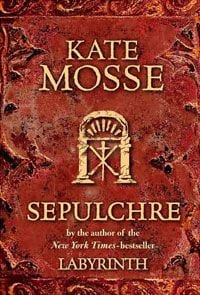
As the follow-up to her best-selling 2005 novel Labyrinth, Kate Mosse has delivered the expected: a gothic melodrama set in the South of France, much occult skulduggery, direct references to Grail legends and Dan Brown, and a narrative divided between the present and an earlier time.
Nor does Mosse neglect an ominous architectural title: Sepulchre. The resulting book, lumbering in its old-fashioned narrative strategies, will not disappoint readers. At least not the ones who like their supernatural suspense, sans irony, to include duels by pistol and torch-bearing villagers advancing on cursed and ancient estates.
The historical narrative, set in 1891, features a posh-yet-plucky 17-year-old named Leonie Vernier — beautiful and intelligent, of course — whose older brother, Anatole, a dilettante journalist, has run afoul of some very bad people.
To free his mysterious mistress from the persecutions of a wealthy spurned lover, Anatole fakes her death at the beginning of the book, spiriting the woman to a safe location outside Paris. Too canny to be fooled for long, the sadistic Victor Constant simply turns his attention to Anatole and his family.
In the present day, an equally pretty and bright young woman, American musical scholar Meredith Martin, travels to Paris to research a biography of Claude Debussy. Raised by a distant relative after the suicide of her deranged and — need I say, beautiful? — “birth mother,” Martin has reason to believe her family roots may lie in the South of France.
Before Meredith leaves Paris, she submits to a tarot reading, the result of a chance encounter. Even the tarot psychic seems astonished by the vague but strikingly consistent way the cards fall, and gives the deck to Meredith. She leaves with a vague sense of being destined to harmonize past and present, a prophecy she can neither accept nor shake.
The twin narratives converge, if not in time then in a place, the La Domaine de la Cade, a portentous gothic mansion in Languedoc. In Leonie’s time, it is the ancestral home of her mother’s family, and she and Anatole visit at the invitation of her recently widowed aunt, whom she’s never met, and who turns out to be relatively young and, yes, beautiful. By Meredith’s time, it has become a hotel, where she resides while digging into her family tree.
Much entertaining nonsense, not a bit of it plausible, takes place in each narrative stream. Curses are involved, nasty old demons, bewitched tarot cards, supernal music, buried Visigoth treasure, murdered village children, not to mention the worldlier pursuits of greed and revenge.
To her credit, Mosse has conducted an impressive amount of occult and historical research that both informs the book and weighs it down.
A great deal of carefully described travel occurs, whether by train, carriage or foot. A book such as “Sepulchre” requires a deliberate pace, to be sure, but the competence of these descriptions does not save them from tedium. Their primary purpose may be to show off the author’s research, for they rarely move the plot enough to justify their detail.
Mosse switches back and forth between the historical and the modern subplots with a deft if elephantine grace — the Leonie passages, conveyed in Frenchified British prose, are filled with corsets and top hats and canes; Meredith, with cell phone and laptop, thinks and speaks in American.
All the characters are creditable, in the two-dimensional way of pop fiction. Leonie and Meredith are equally appealing heroines. The noble Anatole is sufficiently flawed to give him shading. A number of secondary characters, some first seen in Labyrinth, make strong impressions.
The historical passages are the more involving, if only because they require greater imaginative commitment from Mosse. Then, too, the stakes are higher for Anatole and Leonie than for Meredith, and the syphilitic malice of Victor Constant makes for more vivid villainy than the mundane greed of Julian Lawrence.
Yet too often the narrative is flaccid. Entire paragraphs rely exclusive on “to-be” verbs, the dollar-store generics of English prose. One such paragraph, for example, makes use of four verbs — “was” twice, “were” twice. This provides too little grammatical strength for the rich atmospherics Mosse needs it to support.

![Call for Papers: All Things Reconsidered [MUSIC] May-August 2024](https://www.popmatters.com/wp-content/uploads/2024/04/all-things-reconsidered-call-music-may-2024-720x380.jpg)



